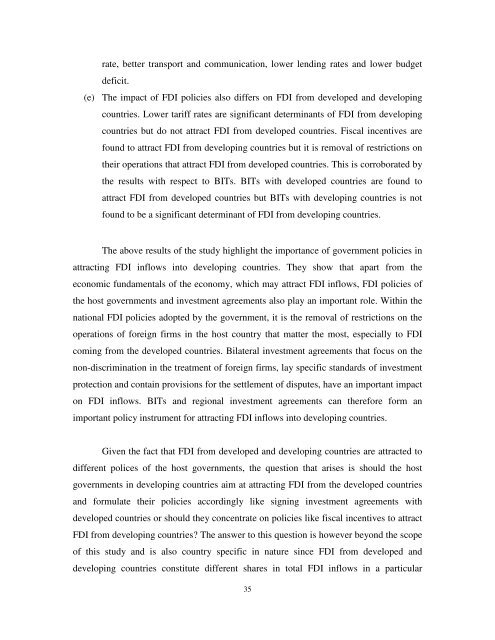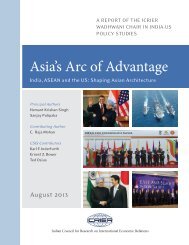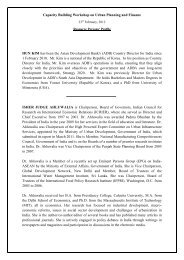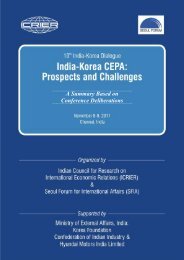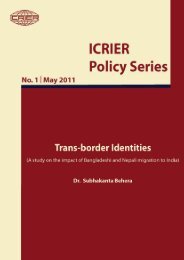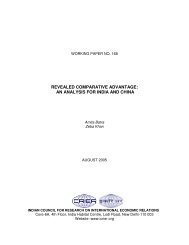impact of government policies and investment agreements on fdi ...
impact of government policies and investment agreements on fdi ...
impact of government policies and investment agreements on fdi ...
Create successful ePaper yourself
Turn your PDF publications into a flip-book with our unique Google optimized e-Paper software.
ate, better transport <str<strong>on</strong>g>and</str<strong>on</strong>g> communicati<strong>on</strong>, lower lending rates <str<strong>on</strong>g>and</str<strong>on</strong>g> lower budget<br />
deficit.<br />
(e) The <str<strong>on</strong>g>impact</str<strong>on</strong>g> <str<strong>on</strong>g>of</str<strong>on</strong>g> FDI <str<strong>on</strong>g>policies</str<strong>on</strong>g> also differs <strong>on</strong> FDI from developed <str<strong>on</strong>g>and</str<strong>on</strong>g> developing<br />
countries. Lower tariff rates are significant determinants <str<strong>on</strong>g>of</str<strong>on</strong>g> FDI from developing<br />
countries but do not attract FDI from developed countries. Fiscal incentives are<br />
found to attract FDI from developing countries but it is removal <str<strong>on</strong>g>of</str<strong>on</strong>g> restricti<strong>on</strong>s <strong>on</strong><br />
their operati<strong>on</strong>s that attract FDI from developed countries. This is corroborated by<br />
the results with respect to BITs. BITs with developed countries are found to<br />
attract FDI from developed countries but BITs with developing countries is not<br />
found to be a significant determinant <str<strong>on</strong>g>of</str<strong>on</strong>g> FDI from developing countries.<br />
The above results <str<strong>on</strong>g>of</str<strong>on</strong>g> the study highlight the importance <str<strong>on</strong>g>of</str<strong>on</strong>g> <str<strong>on</strong>g>government</str<strong>on</strong>g> <str<strong>on</strong>g>policies</str<strong>on</strong>g> in<br />
attracting FDI inflows into developing countries. They show that apart from the<br />
ec<strong>on</strong>omic fundamentals <str<strong>on</strong>g>of</str<strong>on</strong>g> the ec<strong>on</strong>omy, which may attract FDI inflows, FDI <str<strong>on</strong>g>policies</str<strong>on</strong>g> <str<strong>on</strong>g>of</str<strong>on</strong>g><br />
the host <str<strong>on</strong>g>government</str<strong>on</strong>g>s <str<strong>on</strong>g>and</str<strong>on</strong>g> <str<strong>on</strong>g>investment</str<strong>on</strong>g> <str<strong>on</strong>g>agreements</str<strong>on</strong>g> also play an important role. Within the<br />
nati<strong>on</strong>al FDI <str<strong>on</strong>g>policies</str<strong>on</strong>g> adopted by the <str<strong>on</strong>g>government</str<strong>on</strong>g>, it is the removal <str<strong>on</strong>g>of</str<strong>on</strong>g> restricti<strong>on</strong>s <strong>on</strong> the<br />
operati<strong>on</strong>s <str<strong>on</strong>g>of</str<strong>on</strong>g> foreign firms in the host country that matter the most, especially to FDI<br />
coming from the developed countries. Bilateral <str<strong>on</strong>g>investment</str<strong>on</strong>g> <str<strong>on</strong>g>agreements</str<strong>on</strong>g> that focus <strong>on</strong> the<br />
n<strong>on</strong>-discriminati<strong>on</strong> in the treatment <str<strong>on</strong>g>of</str<strong>on</strong>g> foreign firms, lay specific st<str<strong>on</strong>g>and</str<strong>on</strong>g>ards <str<strong>on</strong>g>of</str<strong>on</strong>g> <str<strong>on</strong>g>investment</str<strong>on</strong>g><br />
protecti<strong>on</strong> <str<strong>on</strong>g>and</str<strong>on</strong>g> c<strong>on</strong>tain provisi<strong>on</strong>s for the settlement <str<strong>on</strong>g>of</str<strong>on</strong>g> disputes, have an important <str<strong>on</strong>g>impact</str<strong>on</strong>g><br />
<strong>on</strong> FDI inflows. BITs <str<strong>on</strong>g>and</str<strong>on</strong>g> regi<strong>on</strong>al <str<strong>on</strong>g>investment</str<strong>on</strong>g> <str<strong>on</strong>g>agreements</str<strong>on</strong>g> can therefore form an<br />
important policy instrument for attracting FDI inflows into developing countries.<br />
Given the fact that FDI from developed <str<strong>on</strong>g>and</str<strong>on</strong>g> developing countries are attracted to<br />
different polices <str<strong>on</strong>g>of</str<strong>on</strong>g> the host <str<strong>on</strong>g>government</str<strong>on</strong>g>s, the questi<strong>on</strong> that arises is should the host<br />
<str<strong>on</strong>g>government</str<strong>on</strong>g>s in developing countries aim at attracting FDI from the developed countries<br />
<str<strong>on</strong>g>and</str<strong>on</strong>g> formulate their <str<strong>on</strong>g>policies</str<strong>on</strong>g> accordingly like signing <str<strong>on</strong>g>investment</str<strong>on</strong>g> <str<strong>on</strong>g>agreements</str<strong>on</strong>g> with<br />
developed countries or should they c<strong>on</strong>centrate <strong>on</strong> <str<strong>on</strong>g>policies</str<strong>on</strong>g> like fiscal incentives to attract<br />
FDI from developing countries? The answer to this questi<strong>on</strong> is however bey<strong>on</strong>d the scope<br />
<str<strong>on</strong>g>of</str<strong>on</strong>g> this study <str<strong>on</strong>g>and</str<strong>on</strong>g> is also country specific in nature since FDI from developed <str<strong>on</strong>g>and</str<strong>on</strong>g><br />
developing countries c<strong>on</strong>stitute different shares in total FDI inflows in a particular<br />
35


